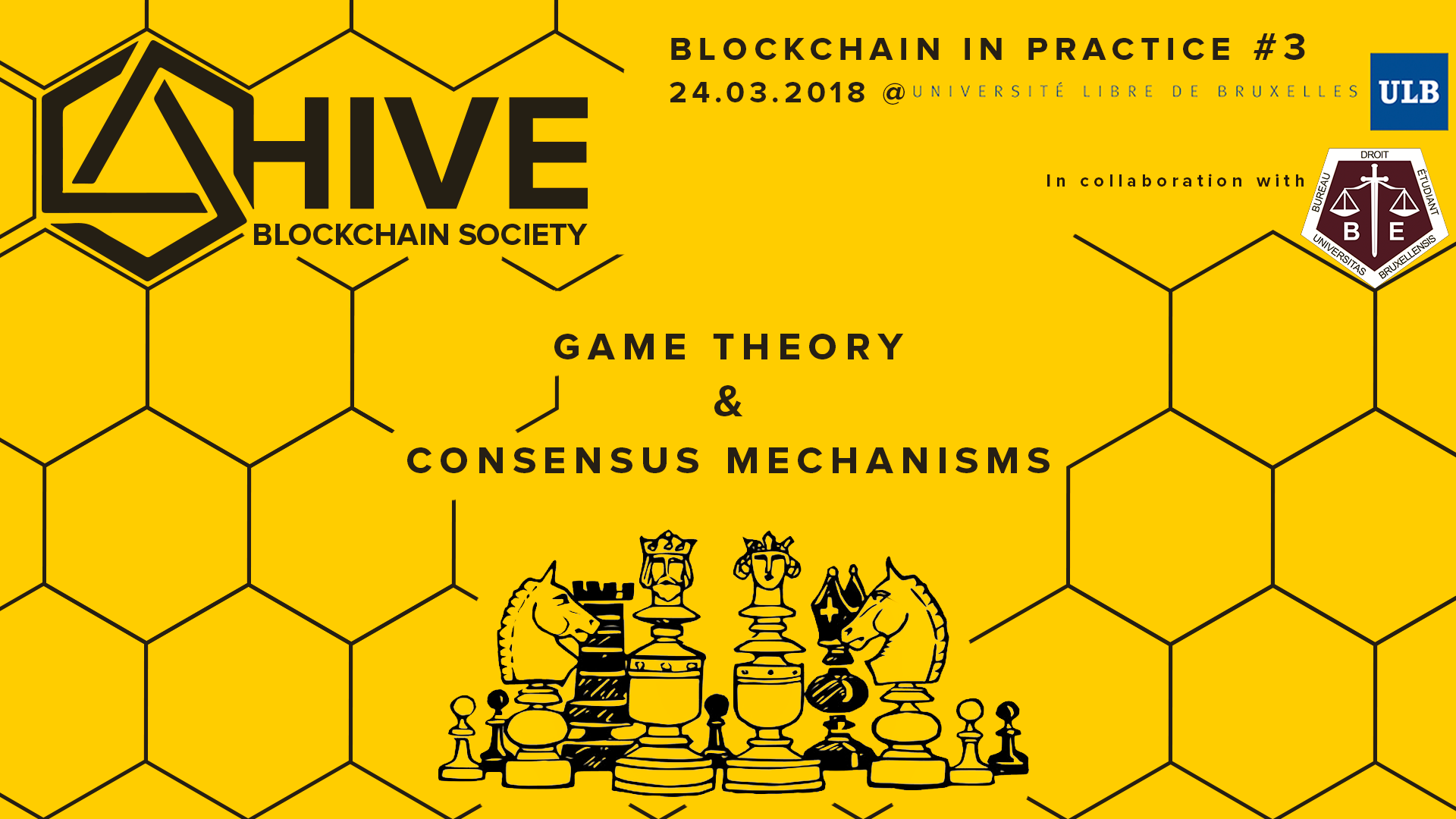The HIVE Blockchain Society is organizing its third Blockchain in Practice event on the 24th of March, at the ULB Campus in Brussels.

After discussing how blockchains could be the foundational layer for peer-to-peer economies at its last edition, the chosen topic this time is Game Theory applied to blockchains and to Consensus Mechanisms in particular.
To introduce this complex, but stimulating topic to our audience, we’ll welcome Dr Jamsheed Shorish as our main speaker for the day. He’s an experienced university teacher with a background in computational economics, finance & mathematics. He’s also the founder and CEO of Shorish Research, which provides strategic consulting services built upon academic and real-world expertise in the area of Computational Business, including Fintech, contract theory and mechanism design, and disruptive technologies such as blockchain.
His presentation will introduce Game Theory, how it already impacts our daily lives, how it applies to blockchains, specifically to the consensus and governance mechanisms ruling blockchains, and finally he will give some insights on game theory and the future of blockchain.
Without further ado, here’s a piece written by Dr Shorish to introduce his presentation:
Why And Whither Game Theory? Incentives and Trust for Blockchain Technology
Dr Jamsheed Shorish
Shorish Research
March 7, 2018
Blockchain technology has captivated the imagination of academics, government entities and private practitioners alike since Bitcoin’s inception in 2009, promising a decentralized and redundant database solution while preserving transaction transparency, immutability and (in the case of public blockchains) anonymity or pseudonymity.
Literally hundreds of billions of dollars have been invested in cryptocurrencies, and the current (as of March 2018) market capitalisation of just the top 10 cryptocurrencies exceeds USD 350 billion. This is proof-positive that cryptocurrencies are, in spite of their recent price volatility, trusted instruments of value. Simply put, people wouldn’t invest at all if they felt that cryptocurrencies didn’t fulfil some role of value that, collectively, all investors agree to.
But how is this done, exactly? At the level of the blockchain protocol, the answer is by building trust through incentives. Bitcoin miners verify bitcoin transactions, and hence build trust, because it is in their best interest to do so. And the proper incentives have been built into the Bitcoin protocol using Game Theory.
What is Game Theory? Game Theory studies how people interact, when they know they are interacting with people who are interacting with them! The resulting interaction is formalized as a game, with players, rules and outcomes. This may seem obvious, but there are many circumstances, such as shopping at a grocery store, where shoppers are playing a game without knowing it, and it took many years for Game Theory to become a formal discipline. From its origins in the 19th century, Game Theory’s realm of application has ranged from medicine to social choice and welfare to global politics to computer science, in addition to its original applications to Economics and Finance.
Game Theory, and its related subject area called Mechanism Design, allows creators of cryptocurrencies to build incentives that reinforce the value, and hence the trust, of a blockchain. Building upon real-world examples, it’s possible to present the fundamentals of Game Theory to anyone interested in understanding better how it can:
- provide a transparent record of transactions;
- prevent embezzlement of funds (“double-spending”);
- incentivize people who have never met to help secure the entire blockchain;
- allow a blockchain’s stakeholders to have a meaningful, fair voice to help determine its future;
- compare private and public blockchains and how they create different incentive structures.
Whether you’re a blockchain practitioner, or someone who’s gotten into crypto and wants to learn more about its foundations, understanding Game Theory, Mechanism Design and their applications to blockchain technology is a prerequisite. Proper incentives go together with the engineering of blockchain technology, and particularly blockchain’s reliance upon cryptography, to build the layers of trust that investors need. With this in hand, new uses for cryptocurrencies and tokens (some of which haven’t even been dreamt of yet!), will usher in an era when cryptocurrency token economics becomes a discipline in its own right, and cryptocurrencies take their place as trustworthy, efficient hodlers ;-) of value.”
To dig deeper into the topic, join us on Saturday, March 24, in Brussels for the whole event and a discussion panel following Dr Shorish’s presentation.
We’ll also enjoy presentations from the Decred Project, as well as Giveth, both explaining how their consensus mechanisms work and what challenges they faced while developing their projects.
All information regarding the event can be found here.
We hope you were enlightened by this paper, and that you’ll join us on the 24th.
